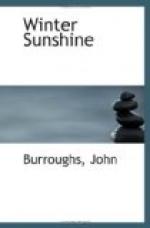The sharp-rayed track of the partridge adds another figure to this fantastic embroidery upon the winter snow. Her course is a clear, strong line, sometimes quite wayward, but generally very direct, steering for the densest, most impenetrable places,—leading you over logs and through brush, alert and expectant, till, suddenly, she bursts up a few yards from you, and goes humming through the trees,—the complete triumph of endurance and vigor. Hardy native bird, may your tracks never be fewer, or your visits to the birch-tree less frequent!
The squirrel tracks—sharp, nervous, and wiry—have their histories also. But how rarely we see squirrels in winter! The naturalists say they are mostly torpid; yet evidently that little pocket-faced depredator, the chipmunk, was not carrying buckwheat for so many days to his hole for nothing: was he anticipating a state of torpidity, or providing against the demands of a very active appetite? Red and gray squirrels are more or less active all winter, though very shy, and, I am inclined to think, partially nocturnal in their habits. Here a gray one has just passed,—came down that tree and went up this; there he dug for a beechnut, and left the burr on the snow. How did he know where to dig? During an unusually severe winter I have known him to make long journeys to a barn, in a remote field, where wheat was stored. How did he know there was wheat there? In attempting to return, the adventurous creature was frequently run down and caught in the deep snow.
His home is in the trunk of some old birch or maple, with an entrance far up amid the branches. In the spring he builds himself a summer-house of small leafy twigs in the top of a neighboring beech, where the young are reared and much of the time is passed. But the safer retreat in the maple is not abandoned, and both old and young resort thither in the fall, or when danger threatens. Whether this temporary residence amid the branches is for elegance or pleasure, or for sanitary reasons or domestic convenience, the naturalist has forgotten to mention.
The elegant creature, so cleanly in its habits, so graceful in its carriage, so nimble and daring in its movements, excites feelings of admiration akin to those awakened by the birds and the fairer forms of nature. His passage through the trees is almost a flight. Indeed, the flying squirrel has little or no advantage over him, and in speed and nimbleness cannot compare with him at all. If he miss his footing and fall, he is sure to catch on the next branch; if the connection be broken, he leaps recklessly for the nearest spray or limb, and secures his hold, even if it be by the aid of his teeth.




